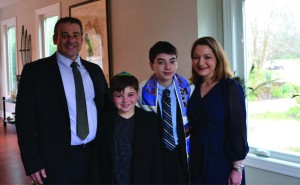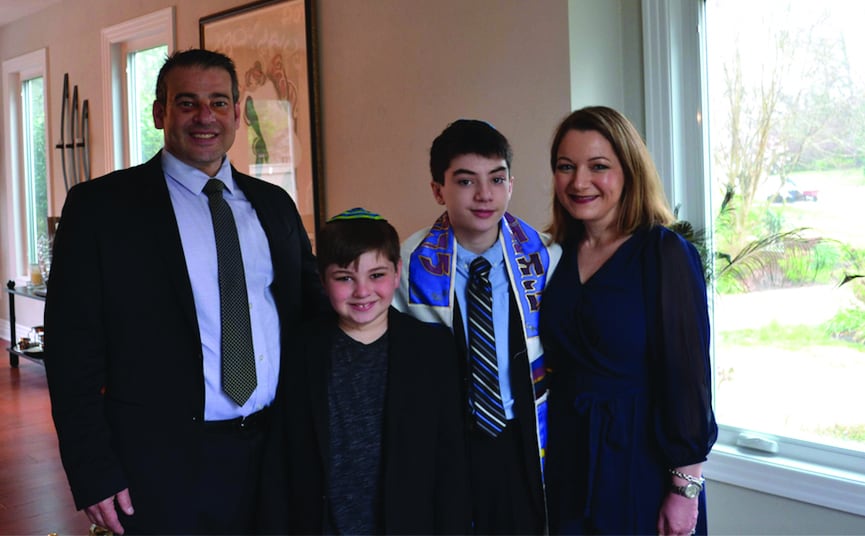 Even before COVID-19, social media has proved itself to both—a cause of, and cure for—social isolation. Then Facebook Live and Zoom zoomed in to save the world.
Even before COVID-19, social media has proved itself to both—a cause of, and cure for—social isolation. Then Facebook Live and Zoom zoomed in to save the world.
You know the world has changed when the social editor for the New York Times travel section issues the first reader-generated ‘travel’ column in the paper’s long history. The name alone, 36 Hours in Wherever You Are, is a sign of the times.
The virtual scene is set in Virginia, where members of the Tidewater Jewish community immediately found new footing and blazed new trails.
Nate Simon became the founding member of the future virtual Bar Mitzvah club. After less than one week in quarantine, a virtual Shabbat with several couples via Zoom, was the brainchild of Sharon Debb.
After a solid year of intense study for his March 21 Bar Mitzvah at Congregation Beth El, Nate Simon was bimah bound.
Nate grew up overnight.
His spring-time Bar Mitzvah met up with a pandemic that shuttered any hope of friends and family from around the world coming together in person to hear him recite his Torah reading (Maftir), Haftarah, and D’var Torah—or place him on a chair and toss it around in the air. Instead, the virus tested his mettle, causing unprecedented cancellations and global quarantines.
Keeping a safe distance from the clergy and congregation became the only kosher thing to do.
“Two weeks before the party, we thought we could still do it,” says Nate’s mother, Carin Simon. “But as the situation became ominous, people got more nervous and started canceling. It just made no sense to have a party where we can’t hold hands, do the hora, and enjoy the food. It was a little like a grief process. First denial, then shock, and eventually acceptance.”
The Bar Mitzvah bonanza was off the table. But not the Bar Mitzvah.
Nate’s determination to have his Bar Mitzvah on that date, and his family’s well of resilience, enabled a traditional religious milestone to morph into a trailblazing virtual home service with two sets of grandparents, one set of parents, a younger brother, and the family dog. Simon’s father Mike set the stage for the makeshift bimah. Carin took on the role of event planner, rabbi, cantor, caterer —and proud mother. After the Torah reading and both parents’ speeches, Nate’s brother Ari Simon subbed for all Nate’s friends who couldn’t physically be there, and gave the candy throwing ritual a bittersweet twist.
Fulfilling his role as set designer, Mike Simon’s ‘ark’ opened and closed in accordance with the service and consisted of a photo of an open ark and a photo of a closed ark, placed at appropriate intervals on the flat screen tv behind the podium. Rocky, the bulldog boxer mix, made several appearances on camera meandering nonplussed with his bone, disrupting no one, and taking nothing away from the sanctity of the occasion.
The ‘unorthodox’ event streamed live on FB where hundreds of people watched in awe, and typed various upbeat and heartfelt responses like ‘amen’ after prayers, ‘Yasha Koach,’ after Torah portions and threw virtual candy. Betty Ann Levin is a family friend who texted to say “Can’t even imagine how your heart is bursting right now. Nate did such an amazing job and you are amazing for pulling all of this together and making it so meaningful under the circumstances.”
The weirdness Nate might have felt about having one of the first virtual Bar Mitzvah ceremonies was lessened by the fact that everyone he knows is going through something. It showed everyone, ‘this is what we do as Jews. We make the most of things.’ “I’m happy that it was cool in a way that everyone will remember it,” says Simon. “I am disappointed that not everyone was there, but I feel good that it’s done.”
When she’s not playing rabbi at her son’s virtual Bar Mitzvah, Carin Simon is the director of Admissions at Strelitz International Academy where she has recently been speaking to prospective parents over Zoom and giving virtual tours. “I also started a FB group for other parents of bar and bat mitzvah kids who are facing the same thing our family did. Nothing is the way you think it’s going to be. You have to rethink everything, and everything’s fair game.”
Another virtual club founder is Sharon Debb, a Norfolk native who moved to New York, married, and lived in Chicago before returning to Virginia Beach to raise her family. The mother of three digital natives group texts with other Jewish women who vent, laugh, and lament daily. During the first week of quarantine life, the idea came to her.
“So, during one of our chats when we were discussing how our kids were talking to their teachers through Meet, it occurred to me that we could do the same. I suggested we have a virtual Shabbat because no matter how different our daily schedules and struggles get, we all have Shabbat in common,” says Debb.
Leah Flax teaches physics at TCC and is used to problem-solving at work and at home. Flax gladly stepped up as the tech wizard uniting the group through Zoom, wine, challah, and candles.
Once the group logged on, joined by Scott and Erica Kaplan in Florida, Stephanie Steerman and her family led the prayers, while everyone lit their respective candles.
“We see each other often at school drop offs and pickups, synagogue, celebrations, and community and private events and it’s always the same greet with a hug and ‘it’s nice to see you.’ While we do mean it, it’s also kind of routine,” says Debb. “It was the best feeling to finally see each other and hear every fifth word or so. Everyone had the best smiles, except me. I’m not really an external smiler.”
Before social distancing became the overnight antidote to a planet in peril, social media was often demonized as the great disconnector. Then COVID-19 became a universal threat sparing nobody, and life changed on a dime.
Amy Weinstein is director of Philanthropy at Beth Sholom Village, and a member of Debb’s tribe. “It was loud, a little crazy, and disorganized, but also the best part of my day,” says Weinstein. “It’s funny how you miss seeing people who you may not have even seen on any given day. After just one week we felt it, and the kids really loved seeing each other. One thing that stood out to me was that everyone was smiling the whole time. It was a long week, and even though it was just the beginning of what will likely be a long few months, it was as loud as it is when we’re all together in person!”
As of April, 2020, and the foreseeable future, social media is the only sacred space for people to celebrate, worship, learn, and live life virtually at weddings, bar mitzvahs, shabbat dinners, Passover seders, and happy hour.
For Jewish Tidewater’s Virtual Community Resources, including fitness classes, children and teen activities, synagogue services, and more, go to www.JewishVa.org.

